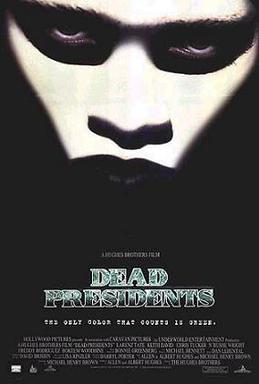 In 1969, Anthony (Larenz Tate) graduates from high school in the Bronx and shocks his family by announcing that he will not be following in his brother’s footsteps by enrolling in city college but that he will instead be enlisting in the Marines and going off to fight in Vietnam. While his friends taunt him for choosing to fight in a “white man’s war,” Anthony thinks that serving in the Marines will make him a man. His two biggest heroes, his father and the local numbers boss, Kirby (Keith David), both served in Korea. Kirby’s even lost his his leg in the war but he can still keep order in the neighborhood.
In 1969, Anthony (Larenz Tate) graduates from high school in the Bronx and shocks his family by announcing that he will not be following in his brother’s footsteps by enrolling in city college but that he will instead be enlisting in the Marines and going off to fight in Vietnam. While his friends taunt him for choosing to fight in a “white man’s war,” Anthony thinks that serving in the Marines will make him a man. His two biggest heroes, his father and the local numbers boss, Kirby (Keith David), both served in Korea. Kirby’s even lost his his leg in the war but he can still keep order in the neighborhood.
Vietnam doesn’t turn out to be what Anthony was expecting. He serves two tours of duty and becomes an efficient killing machine but he is also forced to do things that will haunt him long after the war is over. When Anthony finally returns to the Bronx in 1971, the old neighborhood has changed. Crime, drugs, and poverty are destroying the community and Anthony struggles to support his girlfriend (Rose Jackson) and his daughter.
Finally, with no other opportunities available and feeling as if his country has abandoned him, Anthony agrees to take part in an armored car robbery. Working with him are a few friends from the old days and a few members of the revolutionary Nat Turner Cadre. Anthony thinks that he has the robbery planned out perfectly but nothing ever goes as planned.
In 1993, The Hughes Brothers made their directorial debut with Menace II Society, an incendiary film that holds up as one of the best feature debuts of any filmmaker. Their follow-up to Menace II Society was Dead Presidents. While Dead Presidents operates on a more epic scale than Menace II Society, it’s also a far more uneven film. While the first part of the film (which follows Anthony and his friends during their final days of high school) is strong, things start to fall apart once the action moves to Vietnam. The Hughes Brothers tried to recreate the Vietnam War on a Grenada Invasion budget and the action never feels credible. When Anthony returns to the Bronx, Dead Presidents regains some of its footing but the eventual armored car heist is never as exciting as it could be.
Still, Dead Presidents has enough good moments that it’s always watchable. Larenz Tate gives a good performance as Anthony and he’s surrounded by the some of the best black character actors of the 90s. Keep an eye out for a young and incredibly obnoxious Terrence Howard, playing an aspiring gangster and getting a deserved beating at the hands of Anthony. Though the movie often bites off more than it can chew, it does do a good job of seriously dealing with the issues that returning vets have to contend with when they come back home. Anthony suffers from PTSD, which is something that a lot of people didn’t talk about in 1995, and the Hughes Brothers deserve much credit for their sensitive handling of the topic. Dead Presidents may not be perfect but it’s impossible not to admire the film’s ambition.
